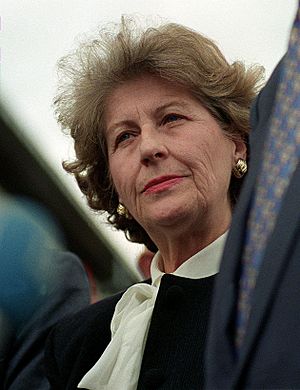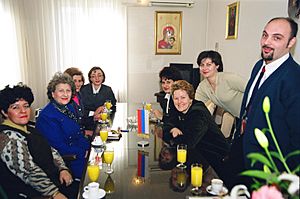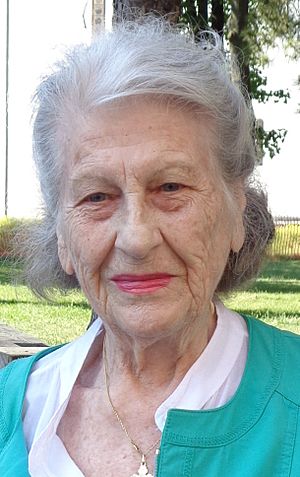Biljana Plavšić facts for kids
Quick facts for kids
Biljana Plavšić
|
|
|---|---|
|
Биљана Плавшић
|
|

Plavšić in 1996
|
|
| 2nd President of Republika Srpska | |
| In office 19 July 1996 – 4 November 1998 |
|
| Vice President | Nikola Koljević Dragoljub Mirjanić |
| Preceded by | Radovan Karadžić |
| Succeeded by | Nikola Poplašen |
| Vice President of Republika Srpska | |
| In office December 1992 – 19 July 1996 Serving with Nikola Koljević
|
|
| President | Radovan Karadžić |
| Preceded by | Office established |
| Succeeded by | Dragoljub Mirjanić |
| Serb Member of the Presidency of Bosnia and Herzegovina | |
| In office 20 December 1990 – 9 April 1992 Serving with Nikola Koljević
|
|
| Preceded by | Office established |
| Succeeded by | Nenad Kecmanović |
| Personal details | |
| Born | 7 July 1930 Tuzla, Kingdom of Yugoslavia |
| Political party | Serb National Alliance (1997–2006) Serb Democratic Party (1990–1997) |
| Alma mater | University of Zagreb |
| Nicknames | Serb Iron Lady Serb Empress (by Željko Ražnatović Arkan) |
Biljana Plavšić (Serbian Cyrillic: Биљана Плавшић; born 7 July 1930) is a former politician and university professor from Bosnia and Herzegovina. She was a leader for the Bosnian Serb people. She served as the President of Republika Srpska. Later, she accepted responsibility for her actions during the Bosnian War.
Plavšić was involved with the International Criminal Tribunal for the former Yugoslavia (ICTY). She was sentenced to 11 years in prison in 2003. She served her time in a Swedish prison. She was released on 27 October 2009. This was after she had served two-thirds of her sentence. Before she became a politician, she taught biology at the University of Sarajevo.
Contents
Academic Career and Research
Biljana Plavšić was a university professor. She taught biology at the University of Sarajevo. She was also the Dean of the Faculty of Natural Sciences and Mathematics. She was a Fulbright Scholar. This allowed her to spend two years at the Boyce-Thompson institute. This institute is located at Cornell University in New York. There, she did research on botany.
She also specialized in electron microscopy in London. She studied plant virology in Prague and Bari. She wrote and published more than one hundred scientific works and papers.
Political Journey
Plavšić was a member of the Serb Democratic Party (SDS). She was the first woman to be part of the Presidency of the Socialist Republic of Bosnia and Herzegovina. She served from November 1990 to April 1992. She was elected in the first multi-party elections in Bosnia and Herzegovina in 1990.
From February to May 1992, Plavšić was one of two acting presidents. This was for the self-declared Serb Republic of Bosnia and Herzegovina. After that, she became one of two Vice-presidents of the Republika Srpska. From November 1992, she was also a member of the Supreme Command of the armed forces of the Republika Srpska.

The Dayton Agreement was signed in 1995. This agreement prevented Radovan Karadžić, who was then the President of Republika Srpska, from holding office. Plavšić was chosen to run as the SDS candidate for President of the Republika Srpska. Her term was for two years.
She later separated from the SDS party. She then formed a new party called Srpski narodni savez (Serbian People's Alliance of the Republika Srpska). She nominated Milorad Dodik as Prime Minister. At that time, Dodik's party, SNSD, had only two members of parliament. She lost the 1998 election to Nikola Poplašen. He was the candidate for the SDS and the Serbian Radical Party of the Republika Srpska. She was a candidate for the reform "Sloga" coalition.
Acceptance of Responsibility and Release
Biljana Plavšić voluntarily went to the International Criminal Tribunal for the Former Yugoslavia (ICTY) on 10 January 2001. She was temporarily released on 6 September of that year.
On 16 December 2002, she accepted responsibility for her actions. She admitted her role in directing the war and targeting civilians. She expressed "full remorse" for her part in the conflict. In return, prosecutors dropped other charges against her.
In March 2005, she gave an interview. She explained that she accepted responsibility because she could not find witnesses to support her. She repeated this in a Swedish magazine interview in January 2009. She stated that accepting responsibility helped reduce her sentence.
She was sentenced to 11 years in prison. She served her sentence at the women's prison Hinseberg in Frövi, Sweden. In December 2008, the Swedish Ministry of Justice did not grant her request for an early release. She had mentioned her age, health, and prison conditions.
On 14 September 2009, Patrick Robinson, President of the United Nations' International Criminal Tribunal for the Former Yugoslavia, stated that Plavšić had shown significant signs of rehabilitation. He also noted that she had accepted responsibility for her actions. Under Swedish law, she became eligible for release on 27 October. She was released on that date.
After her release, Milorad Dodik, who was the Prime Minister of Republika Srpska, sent a government jet to pick her up. He welcomed her to Belgrade. Dodik said his actions were for "purely moral reasons." In November 2009, Milorad Dodik mentioned that he was considering giving Plavšić an office in the Senate. He said they were working on changing the law for former presidents. This would allow Plavšić and other former presidents to have certain benefits. These benefits could include an office, money, a counselor, a secretary, and an official car with a driver.
Awards and Honors
| Award or decoration | Country | |
|---|---|---|
| Order of the Republika Srpska | ||
| Medal For Bravery Miloš Obilić | ||
See also
 In Spanish: Biljana Plavšić para niños
In Spanish: Biljana Plavšić para niños
- Bosnian genocide
- Serbian war crimes in the Yugoslav Wars
 | Precious Adams |
 | Lauren Anderson |
 | Janet Collins |


